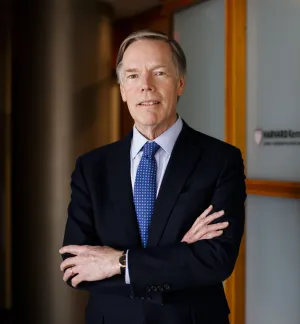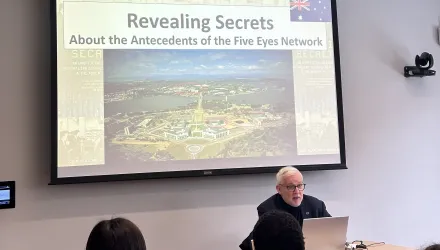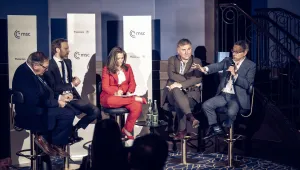For the past quarter century, the U.S. has been one of the leading global advocates in the establishment of war crimes tribunals to investigate and punish those guilty of genocide and other crimes against humanity. The list of countries is long where horrific war crimes have been committed—Bosnia, Kosovo, Lebanon, Afghanistan, Iraq, Darfur, South Sudan, the Central African Republic and Congo.
There are grave concerns now about crimes committed in recent months against the people of Syria, Yemen and the Rohingya population of Myanmar. Presidents Clinton, Bush and Obama all supported international tribunals to bring the guilty to justice.
In this keynote speech delivered January 25, 2018 at a conference on Atrocity Crimes at the Carnegie Endowment for International Peace in Washington, DC, Nicholas Burns called on President Trump, who has not championed vocally human rights and democracy so far in his Presidency, to appoint an American Ambassador-at-Large for War Crimes and to take the baton of Leadership from his Republican and Democratic predecessors on this vital issue.
American Leadership on
Atrocity Crimes and the Fight for Justice
Ambassador (ret.) Nicholas Burns
Carnegie Endowment for International Peace Conference
January 25, 2018
This is an important conference on a vital American interest—standing up for human rights and prosecuting those responsible for atrocity crimes.
I thank the Carnegie Endowment for bringing us together this morning. This conference on this vital subject fits right in the center of the Endowment’s long commitment to a more just world.
It is particularly gratifying for me to be here with so many distinguished American diplomats with whom I served during the last two decades in both Democratic and Republican Administrations.
We all owe a debt of gratitude to the Ambassadors at Large for War Crimes Issues David Scheffer, Pierre Prosper, Clint Williamson and Stephen Rapp. We are in debt to Ambassador Todd Buchwald, to Ambassador John Shattuck, to former State Department Legal Advisor John Bellinger and others here today who held high the American commitment to human rights, to helping the victims of genocide, mass atrocities, torture and abuse.
We salute President Clinton and Secretary Madeleine Albright for creating the Ambassadorial position in the first place. David Scheffer reminded me that we are the only country that has such a position.
The United States has been the central country worldwide that has kept these issues at the center of the attention of the international community. Presidents Bill Clinton, George W. Bush, and Barack Obama all made a clear commitment that we would pursue justice on behalf of the victims. They appointed the public servants I have just saluted. They made pursuing war criminals and trying them a priority. They set a high standard of intolerance for atrocity crimes.
We know, as Americans, that our country has sometimes not met our own high standards for how we should act in the world. Guantanamo, Abu Ghraib, and the use of torture are reminders that we too must always strive to meet our obligations to other countries as well as to ourselves.
In this sense, I believe that President Obama was right to return the U.S. as an observer in the International Criminal Court.
That baton of moral and ethical leadership in our country has now been passed to President Trump. We look forward to his expeditious nomination of an Ambassador at Large who will continue this vital work.
It is a very good sign that Secretary Tillerson has preserved this position in the current reform of the State Department.
- am convinced that the United States must continue to lead the global effort to prevent mass atrocities and to bring those responsible for them to justice. We have been the key global leader for 25 years and will continue to be for the decades ahead.
We have a clear self interest in doing so. We Americans want to live in a world where all people, including ethnic and religious minorities, those on the losing sides of civil wars, the weak, and the unfortunate can be protected from the worst acts of humanity.
As a democratic nation, an immigrant nation, a multi-ethnic and multi-religious nation, we find that there isn’t a conflict in the world where some sizeable segment of our own population doesn’t have a direct interest.
In this sense, we have an ethical and moral interest, an obligation, and a responsibility to act when the worst happens.
Our parents and grandparents—the Greatest Generation—acted with resolve at Nuremberg and Tokyo after the genocide and crimes against humanity of the Second World War.
In the wake of that war, we have resolved “Never Again.” We have built memorials to the victims in every state. The Holocaust Museum here in Washington, where I am proud to serve on the Committee on Conscience, is a living memorial to the victims and a living testament that we are responsible to act for justice in our own time.
All of us here today who served in the U.S. government during the Cold War until today have seen what is at stake.
We did not respond at all to the crimes against humanity that swept over Cambodia from 1975 to 1979, killing at least 1.7 million Cambodians.
We did not respond in time to save 800,000 victims of the Rwandan genocide in the spring and summer of 1994.
We waited too long to intervene in Bosnia between 1991 to the summer of 1995. Hundreds of thousands of people died, millions were made homeless.
I remember vividly as State Department Spokesman in July 1995 that it was the Srebrenica Massacre that shamed us to reconsider our inaction and to resolve to act when the next attacks came against the civilian population of Bosnia-Herzegovina.
We were too late in acting. But, when the Bosnian Serb army shelled the Sarajevo Marketplace in late August 1995, we finally acted. The U.S. military bombed the Bosnian Serb forces. Ambassador Richard Holbrooke negotiated a cease-fire and then secured a final peace at the memorable Dayton Peace Talks that autumn.
And then came Kosovo, Lebanon, Afghanistan, Iraq, Darfur and the killing fields of Syria, South Sudan, the Central African Republic, Congo, Myanmar and other places in the years since.
I have often thought as a diplomat, and now as a professor, that the most difficult decision for American Presidents and their counterparts around the world is this: when do we intervene in the name of justice in someone else’s civil war? And when do we not?
We made the mistake of not intervening in Rwanda. And, with the benefit of hindsight, we made the mistake of intervening in Iraq a decade later.
We made a mistake in recent years of not intervening to help the twelve million homeless Syrians, more than half the population, in the devastating civil war that has engulfed that poor country for the last seven years.
We know that we cannot intervene everywhere. But, we also know that there are times when we must use our power for the good when we can make a clear difference.
These are the difficult decisions that our Presidents and Secretaries of State must make.
But, once the guns are silent, we can and we must always insist that justice is done. That murderers are brought to trial. That War Crimes Tribunals be established to help war-torn societies make sense of what happened, to punish those who must be punished and to find a way to heal.
This moral and political imperative of justice places a special responsibility on the shoulders of the American people. We remain and shall be for decades to come the strongest country in the world.
We are the leader of the West, the democratic world.
We are, in many ways, the author and guardian of the foundational documents of the Free World—Woodrow Wilson’s Fourteen Points, the Atlantic Charter, the United Nations Declaration of Human Rights, the United Nations Charter, the Responsibility to Protect.
As we meet today, it is thus vital that President Trump take the baton of leadership in this domain from his immediate predecessors and run ahead with it.
He must do so because Russia and China will not. In fact, Russia is shielding Bashar al Assad from the judgement of the international community for his repeated use of chemical weapons and his slaughter of millions of innocent Syrian civilians. Russia itself has carried out barbaric bombing of Syrians in Aleppo and now Idlib Province.
China will not hold the military and government of Myanmar responsible for the killing and mistreatment of the Rohingya refugees in 2017.
The U.S., Canada, Europe, Japan, Australia and other members of the West are the natural leaders of the institutions established under our leadership to hold states and their leaders accountable for atrocity crimes in these places and in the Philippines, Yemen, and elsewhere.
That means that we sometimes need to be frank and insistent that our own friends agree to expose themselves to the War Crimes Tribunals when their own citizens are suspects in investigations.
- is the case with the Kosovar government in Pristina. I coordinated the U.S. campaign to support Kosovo as an independent state a decade ago in 2007-2008. But, friends of Kosovo, myself included, now need to stand firmly in support of the Kosovo Specialist Chambers that not only Serbs but also Kosovar Albanians must be investigated for criminal conduct.
The Trump Administration and Germany, Italy, France, and Britain were right to declare in their joint statement of January 4 that an effort by Pristina to block the court would threaten “all that Kosovo has achieved.” Kosovar democracy is at a critical moment, especially in the wake of the tragic assassination last week of the Kosovar Serb leader Oliver Ivanovic.
I think that all of our colleagues here today who have been our leaders in this global effort would be the first to acknowledge that this fight for justice will continue for a very long time into the future.
We know that the pursuit of justice in the wake of brutal wars in an imperative. The International Criminal Tribunal for the former Yugoslavia is a case in point. The horrible Balkans war could not really end until criminals such as Slobodan Milosevic, Radovan Karadzic, and Ratko Mladic were brought to justice. All of the former U.S. officials here, including myself, pushed the Serb government to honor its obligation to bring these men to trial. We were lied to—consistently—by the government in Belgrade. Mladic and Karadzic in particular were harbored beneath the noses of government officials in Serbia or by them directly. But, justice finally prevailed.
That is why President Trump needs to declare his commitment to the cause of justice and to the responsibility of the United States to help propel it forward.
His first twelve months in office have not been encouraging.
He has been nearly silent on human rights, on democracy, and on support for the War Crimes agenda.
Instead, he has embraced autocrats such as Filipino President Duterte.
He did not speak out in support of human rights when he visited Beijing in the autumn.
He did not criticize but actually praised the right-wing populist government of Poland when he gave a major speech in Warsaw in the summer.
As my friend and former colleague John Bellinger has written, the president’s national security strategy “gives human rights short shrift.” And as John points out further in a recent blogpost with Richard Fontaine, this comes at a time when democracy is under siege as last week’s Freedom House report attests.
Donald Trump is the first American President since before FDR who appears not to see himself as the leader of the West and of our democratic values that include justice and doing what is right in the world.
There is plenty of time for the Trump Administration to emulate its Republican and Democratic predecessors. To appoint an Ambassador for at Large for Global Criminal Justice. To speak out in support of the tribunals, and that includes, when it is in our national interest, in support of the International Criminal Court. And importantly, to make sure they have the funds to succeed.
There is so much injustice in the world today—in Syria, in Myanmar, in South Sudan and many other places.
The legacy of the United States as the leading proponent of the many war crimes tribunals in the world today is one that must be honored and continued.
And there is only one way forward—with the U.S. unambiguously in the lead.
Burns, Nicholas. “American Leadership on Atrocity Crimes and the Fight for Justice.” January 25, 2018




